
New norm calls for new education practices in the Philippines, and new cashless payment methods to boot. Source: Shutterstock
The Philippines’ new cashless culture is going back to school
- In the new ‘blended learning’ approach that education institutes in the Philippines are practicing, cashless payments are being introduced, both online and offline
As we noted the other day, it might have taken the Philippines awhile to start ‘going cashless’, but with the pandemic shifting things in favour of contactless or digital alternatives, the floodgates appear to have opened.
Cash-free payment options are popping up all over the archipelago, led by the Philippines’ two biggest e-payment platforms, PayMaya and GCash. From quick-service restaurants to instant fund transfers to paying for taxi rides, the Philippines is making up for lost time on digital payments by enabling cashless integrations over a dizzying variety of formerly cash-only services.
What’s more, at least 70% of Filipino respondents said they intend to stick with cashless payments instead of cold, hard money when the COVID-19 crisis is over, a Visa study showed. “In this new normal, we’re seeing a shift – Filipinos are becoming more digital, and the COVID-19 situation has forced consumers to adopt this change in behavior,” said Dan Wolbert, Visa country manager for the Philippines & Guam.
“Cashless is now emerging as the preferred mode of payment for consumers under the ‘new normal,” said PayMaya president Shailesh Baidwan.
The education sector going cashless
However, the country is still wading through its pandemic response, and this has caused the surge in cashless rollouts not only impacting businesses, consumers, and merchants, but now the education sector as well.
With schools forced to embrace alternative learning solutions for the new schooling year that just started, PayMaya is supplying over 40 schools around the country with online and in-school cashless payment solutions to ease paying for school fees, enrolment fees, and other education expenses.
PayMaya is the biggest end-to-end digital payments ecosystem enabler in the Philippines, and is offering both its online payment gateway for the educational institutes’ online channels, as well as the One by PayMaya Point of Sale (POS) equipment for physical school cashiers.
Higher learning institutes like the Ateneo De Davao University (ADDU), Don Bosco Technical Institute of Makati Inc. (DBTI-MAKATI), Nord Anglia International School Manila (NAIS Manila), Malayan Colleges Mindanao (MCM), and University of Immaculate Conception (UIC) are among the academies that will be enabling both online and offline systems.
The hybrid cashless rollouts by PayMaya are reflective of the Philippines Department of Education’s directive to implement unprecedented ‘blended learning’ outcomes that makes use of both online and in-person modules for education this school year, where students are encouraged to utilize online classes, printed modules, and educational TV and radio broadcast as main learning channels.
Schools and universities that implement PayMaya’s virtual payment gateway will be able to conveniently (and contact-free) process tuition and other payments using debit and credit cards, and e-wallets such as PayMaya’s.
On the flip side, most of these same institutions are also equipping their in-person payment points with the One by PayMaya POS terminal, allowing safer and more seamless payments via the ‘Scan-to-pay via PayMaya’ QR code-based feature, or by touchless-ly tapping their credit, debit, or prepaid cards to the POS terminal.
READ MORE
- The criticality of endpoint management in cybersecurity and operations
- Ethical AI: The renewed importance of safeguarding data and customer privacy in Generative AI applications
- How Japan balances AI-driven opportunities with cybersecurity needs
- Deploying SASE: Benchmarking your approach
- Insurance everywhere all at once: the digital transformation of the APAC insurance industry


